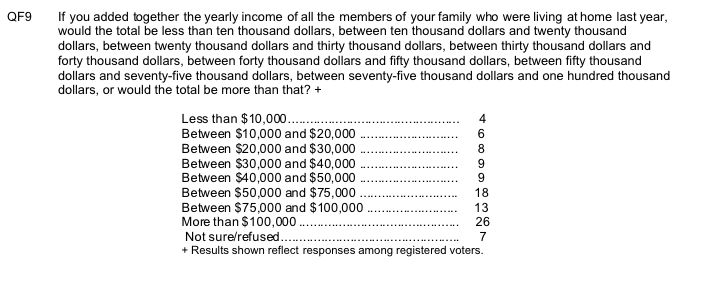NBC-Wall Street Journal Poll - Used by CPD - Disadvantages Low-Income Americans

In recent years, the issue of widening income inequality has ignited a national conversation. It perhaps reached a fever pitch during U.S. Sen. Bernie Sanders’ campaign for president, as millions of low-income donors donated time and time again to the self-proclaimed democratic socialist.
Yet, following his defeat to the Wall Street-funded campaign of Hillary Clinton, many of Sanders’ former supporters are now flocking to the candidacies of third-party candidates like Governor Gary Johnson and Dr. Jill Stein.
To introduce themselves to a national audience in the remaining presidential debates, Johnson and Stein must achieve a 15% average across the five polls that are hand-picked by the Commission on Presidential Debates. Are low-income Americans being adequately represented in these polls?
Of the five polls in question, only the NBC-Wall Street Journal poll makes this information readily available to the public. And, the documentation suggests that this poll undercuts the voices of low-income Americans.
While Census 2014 estimates show that around 47% of American households bring in less than 50k a year, the NBC-Wall Street Journal poll reports that only around 36% of its respondents fall into this income category.
Maybe it is just harder to poll low-income Americans? Maybe high-income Americans have more time to devote for answering phone calls from pollsters?
Let’s check a point of comparison: The ABC-Washington Post poll, which is also used by the CPD.
I am thankful to E.G., a staff member at the Washington Post, who professionally and promptly responded to requests for more information on the poll. According to her email, the ABC-Washington Post poll has around 50% representation of Americans who make less than $50,000 and about 50% representation for those who make more than $50,000. That’s fantastic, because that’s right around the figure given by the Census.
As such, even when compared to its sister poll, the NBC-Wall Street Journal poll still fails to include as many lower-income Americans as it should. And, importantly, NBC provided me with documentation not available to the public. These documents show that the poll does not attempt to statistically correct for skewed income sampling.
It seems unjust that this poll be allowed to influence debate participation. All Americans, regardless of their income, deserve to have their voices represented. Johnson and Stein have likely had billions of dollars of free media taken from them as a result of these skewed polls.
Open the debates.




